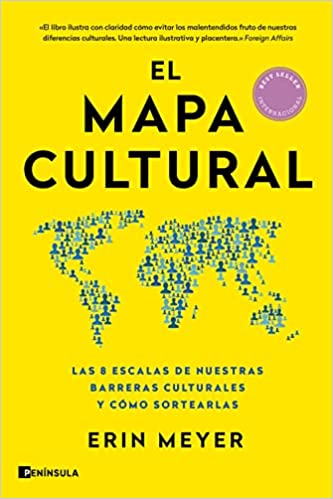
'The Culture Map,' a book to understand the differences between Americans and Latinos, in Spanish
Erin Meyer, an American living in Paris, discusses the eight scales of our cultural barriers and how to overcome them.
When you've been working with people of different nationalities for some time, you've probably noticed that Americans are full of flattery before giving critique, while Germans don't mince words; or that Asians show reverence for hierarchy, while Swedes think anyone can be a boss.
Communication between cultures is the great challenge of the global economy, and having the necessary keys to facilitate understanding can be the difference between success and failure. This is what Erin Meyer, an expert in cultural communication from the Insead Business School (in Paris, France) tells us in the book The Culture Map, recently translated to Spanish, where she describes the eight differential points of our cultural traits and provide us with the tools to effectively face the most common communication challenges in the world of international relations.
Originally published in English in 2014, The Cultural Map has become the go-to read for anyone who wants to navigate most consciously and comfortably in this subtle, and sometimes treacherous, terrain where people from different backgrounds are expected to work together in harmony.
When it comes to cultural differences, Meyer, 51, has a lot to tell, starting with her life story. An American living in Paris, she defines herself as a "mix of Minnesota provincial and Parisian, from the positive naïve friendliness of Americans to the capital arrogance of Parisians," she said on Monday, Jan. 24, in an interview with the Barcelona daily La Vanguardia.
An American living in Paris, Erin began her career teaching English students in Botswana as a Peace Corps volunteer and later worked with Asian immigrants in the United States. She frequently gives keynote speeches and runs seminars for organizations such as the World Bank, the United Nations, Google, Johnson & Johnson, Toshiba, Twitter, L'Oréal, ExxonMobil and BNP Paribas, among others.
On the occasion of the publication of her book in Spanish, Meyer has taken advantage to delve into the differences between Americans and Spaniards. She admitted, for example, that "Americans tend to get to the point" and, on the other hand, Spaniards like to theorize and dissert before getting to the point.
"Then Americans repeat the essentials to make sure you've understood and ask you again," she added, as quoted in La Vanguardia.
The difference is mainly due to the fact that "Latinos tend to leave the central message for the end and start revealing layer after layer and linger on subtleties as if they wanted to surprise themselves with something new that even they didn't know, waiting until the last minute to say the essential," she commented.
On the other hand — she added — "Americans are focused on making you understand what they want to say and not so much on showing off. That sometimes makes them seem naïve, simple or heavy. Success for the American is that you understand it; for the Spaniard, success is that you value it and even admire it."
Another example is the tendency of Latinos to be more critical and pessimistic is because they tend to value criticism more than consensus, whereas in the United States, they are taught to be optimistic from very early on.
"Americans are taught in school to say at least three positive things for every negative one. So, we tend to repeat Amazing!, Awsome! Great!" she said. In the workplace, that translates to the fact that in the U.S., a boss must say what's good about everyone before he or she starts criticizing.












LEAVE A COMMENT:
Join the discussion! Leave a comment.